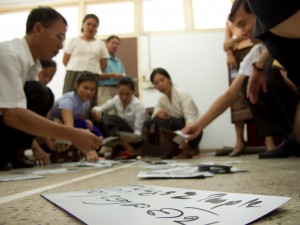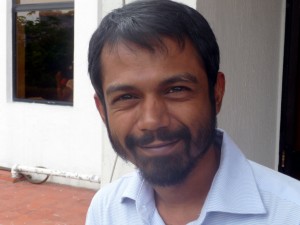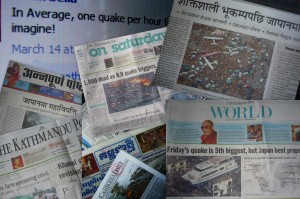10 radio journalism and audio training resources
When it comes to professional radio journalism and audio production training, it's hard to beat having the opportunity to attend workshops conducted by experts. But if you have access to the net, learning new skills or brushing up on the basics via online tutorials and web resources could be the next best thing.

Whether you're a working journalist, trainer or j-student, here is a selection of resources useful for radio journalism and producing audio materials.
![]() read more
read more
Educators embark into a new era of journalism in Laos
 Is there a proper definition of journalism in the Lao language? Since DW-AKADEMIE’s first workshop on journalism at the National University of Laos in Vientiane, there is. It was conceived by 15 staff teachers of the Department of Mass Communication at the Faculty of Letters – after long discussions revolving around somewhat abstract terms like “media”, “the public”, “society” and “information”.
Is there a proper definition of journalism in the Lao language? Since DW-AKADEMIE’s first workshop on journalism at the National University of Laos in Vientiane, there is. It was conceived by 15 staff teachers of the Department of Mass Communication at the Faculty of Letters – after long discussions revolving around somewhat abstract terms like “media”, “the public”, “society” and “information”.
Lao is not a language that lends itself to describing abstract ideas. Yet the 15 teachers feel it was worth the effort to lay a foundation they now can build upon. They are learning the mindset, tools and skills that in combination make a journalist. The reasoning behind this is that they are the ones training a new generation of Lao students who are eager to take on the profession.
![]() read more
read more
Creating a new morning show in Vietnam
What does it take to produce a successful radio program? And how can you motivate the people in northern Vietnam's Quang Ninh Province to tune in? That's what the radio staff of Quang Ninh Radio & TV and DW-AKADEMIE are exploring at the moment in cooperation with Friedrich Ebert Stiftung and Vietnam's Academy of Journalism and Communication.
This week, DW trainers and QTV radio journalists drew up plans for a new morning radio show. It will be called "QTV Rush Hour" and will run between 6:30 and 7:30 every morning. The show will include music, information and audience participation elements.
On Thursday, March 31st, the Vietnamese journalists recorded a pilot for the new morning show. If all goes well, the show will start airing live next month.
Text and pictures: Thorsten Karg, DW-AKADEMIE trainer
Live blogs reveal a huge appetite for information

Photo credit: Flickr/@afloden
![]() read more
read more
How media in the Philippines report on Japan
By Leo Gatdula, Manila
 The powerful earthquake that rocked Japan on March 11, 2011 is big news in the Philippines not only because of the extent of the disaster itself, but also because there are about 300,000 Filipinos in Japan.
The powerful earthquake that rocked Japan on March 11, 2011 is big news in the Philippines not only because of the extent of the disaster itself, but also because there are about 300,000 Filipinos in Japan.
The Philippine media have focused their coverage on the plight of Filipinos working in the richest country in Asia. Every day, Filipinos in the Philippines are provided with reports about how much some Filipinos in Japan want to return to the Philippines and how they are coping with the tragedy.
Focusing on Filipino workers in Japan
Overseas Filipino Workers (OFWs) in Japan and other parts of the world send billions of dollars back home, helping keep the Philippine economy afloat. It’s one of the reasons why they’re called “modern-day heroes” in the Philippines.
Thus, an OFW-related event is bound be an emotionally charged issue in the country. Whether it’s Filipino sailors seized by Somali pirates or Filipino workers fleeing violence-torn Libya, an OFW-related event will get big-time coverage in the Philippines.
![]() read more
read more
Nepali media and Japanese disaster
By Shyam Rai, Kathmandu, Nepal
 Radio Nepal news editor Shyam Rai writes that the Nepali media covered the disaster in Japan from the very beginning. The first reason for this is that the incident itself was huge and newsworthy.
Radio Nepal news editor Shyam Rai writes that the Nepali media covered the disaster in Japan from the very beginning. The first reason for this is that the incident itself was huge and newsworthy.
The second reason is that sometimes even small incidents taking place in Japan (which might not get space in other countries’ media) are reported by Nepali media because Japan is one of Nepal’s major donor countries and contributes greatly to its development.
At first the media focused primarily on casualties and losses caused by the earthquake and tsunami. Some broadsheet newspapers and radio stations carried the incident on the front page and as a top story respectively whereas some included it in their international segments.
All of them focused on casualties and the destruction followed by damages caused to the nuclear reactors in Fukushima.
![]() read more
read more
Japanese tragedies stir nuclear debate in Indonesia
By Permadi Kencono Wulan
 From Indonesia former DW-AKADEMIE trainee Permadi Kencono Wulan writes that almost all of the country’s media have been covering the events in Japan from the moments they began. Focus has been on memories of the tsunami that happened in Indonesia, the strength and fortitude of the Japanese people, the impact of the damaged nuclear reactors and on Indonesian eyewitnesses who had been living in Japan, alongside interviews with celebrities who have lived there.
From Indonesia former DW-AKADEMIE trainee Permadi Kencono Wulan writes that almost all of the country’s media have been covering the events in Japan from the moments they began. Focus has been on memories of the tsunami that happened in Indonesia, the strength and fortitude of the Japanese people, the impact of the damaged nuclear reactors and on Indonesian eyewitnesses who had been living in Japan, alongside interviews with celebrities who have lived there.
News also stirred about Japanese adult film star Miyabi who had gone missing after the tsunami. Much news space in Indonesia was devoted to coverage of the evacuation and the impact of the nuclear reactors at Fukushima.
The impact of an exploding nuclear reactor
Permadi, who is head of new media at RRI Indonesia, highlighted early reports by Indonesia’s Metro TV on the impact of a nuclear reactor that exploded and the possibility of radiation. It communicated how this concerns the world community at large and Indonesia in particular because of the effects of radiation that might spread due to wind, sea water, birds and migrating fish.
![]() read more
read more
Khmer coverage of Japan’s tsunami
By Raksmey Meas
 Raksmey Meas, assistant lecturer at the Department of Media and Communication at the Royal University of Phnom Penh, reports that Japan’s catastrophe involving the recent earthquake and subsequent tsunami has yet again taken center stage in the world media’s attention.
Raksmey Meas, assistant lecturer at the Department of Media and Communication at the Royal University of Phnom Penh, reports that Japan’s catastrophe involving the recent earthquake and subsequent tsunami has yet again taken center stage in the world media’s attention.
Particularly in Cambodia, news related to Japan and its disaster racked up on front pages for more than a week following the initial shock on March 11th.
Regarding the focus of Cambodian media on this tragedy, news angles seem to be anything on the updates of the situation – death toll, possible nuclear explosion and rescue efforts, etc.
![]() read more
read more
Japan through the news lens of Bangladesh
By Taufique Ahmed, Dhaka, Bangladesh
 Bangladesh is shocked by what has happened in Japan. People here have closely followed the news to get the latest updates from newspapers, TV, radio and online.
Bangladesh is shocked by what has happened in Japan. People here have closely followed the news to get the latest updates from newspapers, TV, radio and online.
It’s very tough for the media to handle what’s happening in Japan, as there is also another big issue that the people of Bangladesh worry about very much. Many people here are still taken aback by the latest events in Libya, because many Bangladeshis live and work there and have now become victims of the uprising in this North African country.
Japan's tsunami and earthquake are still important news in Bangladesh, as this country is also one of the sufferers of climate change. Nonetheless, Japan's nuclear crisis is also getting attention in the newspapers and at TV and radio stations here as the situation worsens.
![]() read more
read more
Asian media coverage of Japan in crisis
 Recent events in Japan shocked the world. The magnitude 9.0 earthquake that hit on March 11th and the tsunami and nuclear disaster it triggered have been top developing stories for media everywhere. But the focus and style of reporting differ from one country or region to the next.
Recent events in Japan shocked the world. The magnitude 9.0 earthquake that hit on March 11th and the tsunami and nuclear disaster it triggered have been top developing stories for media everywhere. But the focus and style of reporting differ from one country or region to the next.![]() read more
read more








Feedback